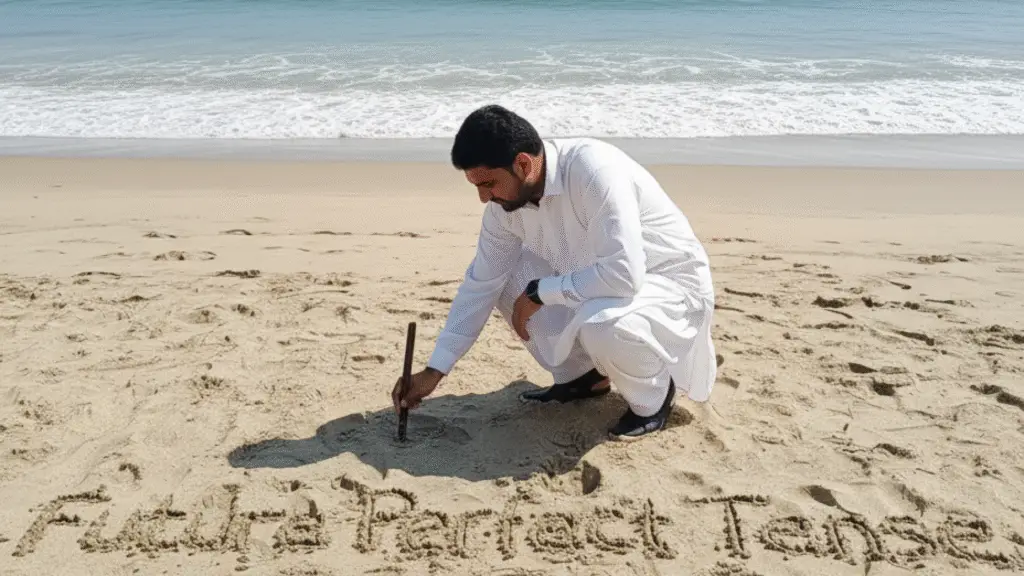1. Introduction: Peering into the Future’s Past

Imagine it is Monday, and you are planning your week. You think to yourself, “By Friday, I will have finished my big project.” In that simple thought, a complex mental operation has occurred. You have mentally projected yourself to a point in the future (Friday) and looked back at an action that is now completed. This remarkable ability to navigate time with language is the magic of the Future Perfect Tense.
This tense is a cornerstone of advanced English grammar, allowing speakers and writers to express future-oriented actions with a level of precision that simpler tenses cannot match. It is the tool used to talk about actions that will be completed before another point or event in the future. This concept of a “past in the future” is fundamental to its function.
Understanding and mastering the Future Perfect Tense is more than just an academic exercise; it is a important step toward achieving true fluency. This tense is indispensable for clearly communicating plans, setting goals, and making accurate predictions. While the simple future tense (“I will go”) places an event on a future timeline, the future perfect tense (“By 8 PM, I will have gone”) creates a relationship between two future points, demonstrating a sophisticated ability to sequence events and structure thoughts logically. This article will provide a comprehensive, student-friendly exploration of the Future Perfect Tense, transforming it from an intimidating grammatical rule into a powerful and practical tool in any English learner’s arsenal.
2. Definition of Future Perfect Tense
It is helpful to view it through two distinct lenses to fully understand the Future Perfect Tense,: one academic and precise, the other simplified and functional. This dual approach ensures that learners of all backgrounds.
The Academic Definition
From a linguistic standpoint, the Future Perfect is a verb construction that combines future tense (indicated by the modal auxiliary will) with the perfect aspect (indicated by have + the past participle). The perfect aspect in English grammar signifies completion. Therefore, the Future Perfect Tense is used to describe an event that is expected or planned to be completed before a specific time of reference in the future. It projects the speaker forward in time to look back at an action that will be concluded. In short, it frames a future action as a past event from a future vantage point.
For example, in the sentence, “By 2030, scientists will have discovered a cure,” the point of reference is the year 2030. The action of discovering a cure is placed in the “past” relative to that future date.
The Simplified Definition
For learners who find grammatical terms like “perfect aspect” confusing, a more intuitive analogy is highly effective. Think of the Future Perfect Tense as setting a “deadline” for a future action. The main idea is that the action must be finished before this future deadline arrives.
Consider this simple framework:
- Future Deadline: 9 PM tonight.
- Action: To do homework.
Using the Future Perfect, one would say: “By 9 PM, I will have done my homework.”
This “deadline” can be a specific time (like 9 PM), another future event (“by the time you arrive”), or a general future period (“by next year”). This approach grounds the tense in a universally understood concept, making it easier to remember and apply in practical, everyday situations involving plans, schedules, and goals. It is a way of talking about the past, but from a perspective that is still in the future.
3. Importance of the Future Perfect Tense
While not as frequently used in casual conversation as the simple future, the Future Perfect Tense holds immense strategic value in contexts where precision, clarity, and foresight are paramount. Its importance lies not in its frequency, but in its power to convey complex temporal relationships, making its mastery a key differentiator for advanced English users.
Role in Academic and Professional Writing
In academic and professional environments, ambiguity can be detrimental. The Future Perfect Tense is a critical tool for outlining project timelines, research proposals, and business strategies with absolute clarity. It demonstrates meticulous planning and a clear understanding of sequential dependencies.
- Project Management: “By the end of the third quarter, the development team will have completed the beta testing phase.”
- Academic Research: “The study is projected to conclude in 2028; by that time, we will have analyzed over a decade’s worth of climate data.”
- Business Reports: “By the time the merger is finalized, our legal department will have reviewed all relevant contracts.”
Using this tense in such contexts signals competence and a forward-thinking mindset, assuring readers that future milestones are well-defined and achievable.
4. Form and Structure of Future Perfect Tense
The structure of the Future Perfect Tense is remarkably consistent and straightforward. Once the basic formula is learned, it can be applied universally without the complex subject-verb agreement rules that complicate other tenses.
Sentence Structures with Formulas
The tense is constructed using the modal auxiliary will, the auxiliary verb have, and the past participle (often called V3, or the third form of the verb) of the main verb.
Affirmative (+)
The standard positive structure follows a simple formula.
- Formula: Subject + will have + V3 (past participle)
- Example: He will have finished the report by five o’clock.
- Example: They will have arrived by the time the movie starts.
Negative (–)
To form a negative sentence, not is placed after the modal verb will.
- Formula: Subject + will not (won’t) have + V3
- Example: She will not have finished the report by five o’clock.
- Example: They won’t have arrived by the time the movie starts.
Interrogative (?)
To ask a question, the modal verb will is inverted with the subject.
- Formula: Will + Subject + have + V3?
- Example: Will she have finished the report by five o’clock?
- Example: Will they have arrived by the time the movie starts?
Use of Auxiliaries will and shall
In modern English, will is the standard auxiliary verb used with all subjects (I, you, he, she, it, we, they) to form the future tenses. The auxiliary shall can also be used, but its application is more limited and is generally considered more formal or archaic.
Traditionally, shall was prescribed for first-person subjects (I and we), while will was used for second and third persons (you, he, she, it, they). While this rule is still observed in some formal contexts, particularly in British English,
will is now overwhelmingly common in all situations.
- Standard Usage: I will have completed the task.
- Formal Usage: I shall have completed the task.
Contracted Forms
In spoken English and informal writing, contractions are essential for natural and fluent communication. The subject and the auxiliary will are often contracted, as are will and not.
- I will → I‘ll (I’ll have gone.)
- You will → You’ll (You’ll have seen it.)
- He/She/It will → He’ll/She’ll/It’ll (He’ll have decided.)
- We will → We’ll (We’ll have left.)
- They will → They’ll (They’ll have finished.)
- will not → won’t (They won’t have finished.)
The following table provides a clear, scannable summary of these structures.
Table 1: Future Perfect Sentence Structure at a Glance
| Form | Formula | Example |
| Affirmative (+) | Subject + will have + V3 | They will have arrived. |
| Negative (–) | Subject + won’t have + V3 | They won’t have arrived. |
| Interrogative (?) | Will + Subject + have + V3? | Will they have arrived? |
| Negative Interrogative (?) | Won’t + Subject + have + V3? | Won’t they have arrived? |
5. Functional Uses of Future Perfect Tense
Understanding the structure is the first step; knowing when and why to use it is the key to mastery. The Future Perfect Tense serves several distinct communicative functions, each adding a layer of nuance and precision to discussions about the future.
Actions Completed Before a Specific Future Time
This is the most common and fundamental use of the tense. It is employed to state that an action will be finished at or before a clearly defined point in the future. This future point acts as a deadline for the completion of the action.
- Example: By 10 PM tonight, the concert will have ended.
- Example: I will have submitted my thesis by the end of the semester.
- Example: In three years’ time, the city will have built the new bridge.
In each case, the action (ending, submitting, building) is viewed as complete when looking back from the specified future time.
Actions Completed Before Another Future Action
Often, the “deadline” is not a specific time but another future event. This creates a sequence of two future actions, where the action in the Future Perfect Tense happens first. The clause describing the second action typically uses the Simple Present Tense, not a future tense.
- Example: The guests will have arrived by the time we finish cooking.
- (First: The guests arrive. Second: We finish cooking.)
- Example: She will have learned enough Japanese before she moves to Tokyo.
- (First: She learns Japanese. Second: She moves.)
- Example: By the time the store opens, we will have been waiting in line for an hour. (Note: This is the Future Perfect Continuous, which emphasizes duration, but the principle is the same).
Expressing Duration with Stative Verbs
While the Future Perfect often describes the completion of an action, it can also be used with stative verbs (verbs that describe a state, not an action, like know, be, have, live) to express the duration of that state up to a specific future point.
- Example: By next month, they will have been employed for 20 years.
- Example: On my next birthday, I will have lived in this city for a decade.
- Example: When he retires, he will have worked at the company for over 40 years.
This usage highlights the continuation of a state over a period that culminates at a future moment.
Making Predictions or Assumptions about the Present/Past
This is a more advanced function of the tense. Here, will have is used not to talk about the future, but to express a confident assumption or logical deduction about an event that has likely already happened by the present moment. The modal will in this context signals a high degree of certainty rather than futurity.
- Example: (A friend was supposed to take a flight that landed an hour ago.) “Don’t call him now; he will have turned off his phone for landing.” (An assumption about the recent past).
- Example: (It is 7 PM, and your colleague always leaves work at 5 PM.) “There’s no point going to the office; he will have left by now.” (A logical deduction about the present situation).
- Example: (Looking at a student’s completed exam paper.) “Judging by the details, he will have studied very hard for this.” (An inference about the past based on present evidence).
This function demonstrates how the Future Perfect is not strictly a “future” tense but a “relative” tense, capable of shifting its temporal focus to express degrees of certainty about completed actions in various time frames.
6. Time Expressions Commonly Used
One of the most helpful ways to identify when the Future Perfect Tense is needed is to recognize the specific time expressions, or “signal words,” that frequently accompany it. These phrases establish the future deadline before which the action must be completed. Mastering these expressions provides a practical toolkit for constructing grammatically correct and contextually appropriate sentences.
The most common time markers include:
- By + [a specific time, day, month, or year]: This is the most direct way to set a deadline.
- Example: By midnight, I will have finished the book.
- By the time + [a clause in the simple present tense]: This uses another action as the deadline. It is a very common and important structure.
- Example: By the time you get home, I will have cooked dinner.
- Before + [a noun or clause]: This explicitly marks the sequence of events, emphasizing that the Future Perfect action occurs first.
- Example: We will have left before the storm arrives.
- In + [a period of time]’s time: This phrase marks the end point of a future duration.
- Example: In two years’ time, she will have completed her master’s degree.
- By then: This adverbial phrase refers back to a future time that has already been mentioned.
- Example: The conference ends on Friday. I hope we will have reached an agreement by then.
- Within + [a period of time]: This indicates that the action will be completed at some point inside the specified future timeframe.
- Example: The company will have launched the new product within six months.
The following table organizes these key expressions for easy reference, providing a “cheat sheet” for learners to quickly identify situations that call for the Future Perfect Tense.
Table 2: Your Guide to Future Perfect Time Expressions
| Time Expression | Function | Example Sentence |
| By + [specific time/date] | Sets a clear deadline. | By 8:00 PM, I will have finished my homework. |
| By the time + [present tense clause] | Uses another future action as the deadline. | By the time you arrive, we will have eaten dinner. |
| Before + [event/time] | Emphasizes that one action is completed prior to another. | She will have left before the meeting starts. |
| In + [time period]’s time | Marks the end of a future period. | In three years’ time, I will have graduated. |
| By then | Refers to a previously mentioned future time. | The party starts at 9. We will have arrived by then. |
| Within + [time period] | Indicates completion inside a future timeframe. | The team will have completed the project within six months. |
7. Rules and Patterns
While the concept of the Future Perfect can be challenging, its grammatical rules are surprisingly simple and consistent. This section covers the key patterns and conventions that govern its use, highlighting aspects that make it easier to learn than many other English tenses.
Subject–Verb Agreement
One of the most learner-friendly aspects of the Future Perfect Tense is the complete absence of complex subject-verb agreement rules. The verb form will have + past participle remains the same regardless of the person (first, second, or third) or number (singular or plural) of the subject.
This contrasts sharply with tenses like the Present Simple (e.g., I walk vs. he walks) or the Present Perfect (e.g., I have walked vs. he has walked). This structural rigidity is a significant advantage for learners, as it means that once the basic formula is memorized, it can be applied universally.
- I will have decided.
- You will have decided.
- He/She/It will have decided.
- We will have decided.
- They will have decided.
This consistency allows learners to focus their mental energy on the conceptual challenge of understanding the timeline, rather than on memorizing different verb conjugations.
Compatibility with Stative and Dynamic Verbs
The Future Perfect Tense is versatile and can be used with both dynamic and stative verbs, although its meaning shifts slightly.
- Dynamic Verbs (Action Verbs): When used with dynamic verbs like finish, build, eat, or write, the tense indicates the completion of an action.
- Example: By next year, they will have built the new hospital.
- Stative Verbs (State Verbs): When used with stative verbs like know, live, be, or have, the tense typically indicates the duration of a state up to a specific point in the future.
- Example: By 2030, I will have lived here for twenty years. (The state of living continues up to 2030).
- Example: Next week, we will have known each other for a full year. (The state of knowing reaches the one-year mark next week).
Formal vs. Informal Usage
The choice of auxiliary verb and the use of contractions can signal the level of formality in communication.
- Formal: In highly formal writing (such as legal documents or academic papers), shall is sometimes used with I and we instead of will. Full forms like will not are preferred over contractions.
- Example: We shall have reviewed the evidence by the court date.
- Example: The committee will not have reached a decision before Friday.
- Informal: In everyday speech and informal writing (like emails to colleagues or text messages), contractions are standard and essential for sounding natural.
- Example: I’ll have finished by the time you get here.
- Example: They won’t have seen the message yet.
Understanding these conventions allows speakers and writers to modulate their language to suit the context appropriately.
8. Common Errors
Mastering any new grammatical structure involves navigating a few common pitfalls. The errors associated with the Future Perfect Tense are systematic and predictable, often stemming from confusion with other tenses or overgeneralization of other English grammar rules. By understanding these common mistakes, learners can preemptively correct them.
Confusing Future Perfect with Future Simple
This is the most frequent conceptual error. Learners often use the Future Simple when the context requires the Future Perfect. The key is to remember that the Future Perfect emphasizes completion before a deadline.
- Future Simple: I will finish my homework. (A general statement about a future action. The time of completion is not specified.)
- Future Perfect: I will have finished my homework by 8 PM. (A specific statement that the homework will be complete before 8 PM.)
How to Avoid: Always ask: “Is there a future deadline in the sentence (e.g., by tomorrow, by the time you arrive)?
- Does the sentence stress that the action will be completed before that deadline?”
- If the answer is yes, the Future Perfect is likely the correct choice.
Incorrect Use of Past Participles
The Future Perfect formula requires the V3, or past participle, of the main verb. Learners often mistakenly use the simple past (V2) or the base form (V1), especially with irregular verbs.
- Incorrect:By next year, I will have went to Japan.
- Correct: She will have written the letter by then.
- Incorrect:She will have wrote the letter by then.
- Correct: By next year, I will have gone to Japan.
Mixing it with Present Perfect
This error involves confusing the point of reference. The Present Perfect relates a past action to the present, while the Future Perfect relates a future action to another point in the future.
- Present Perfect: I have finished the report. (The report is finished now.)
- Future Perfect: I will have finished the report by tomorrow. (The report will be finished before tomorrow.)
How to Avoid: Identify the time of reference. Is the action completed before now or before a future time? This distinction will determine which perfect tense to use.
Incorrect Verb Form After will
A very common structural mistake is to apply the third-person singular rule of the Present Perfect (has) to the Future Perfect. This is an overgeneralization of a grammar rule. The auxiliary verb following will is always have.
- Incorrect: He will has left by the time we arrive.
- Correct: He will have left by the time we arrive.
Incorrect Word Order in Questions
When forming questions, learners sometimes fail to invert the subject and the modal verb will correctly.
- Incorrect: Will have you completed the project by Friday?
- Correct: Will you have completed the project by Friday?
How to Avoid: Remember that in questions, only the first auxiliary verb (will) moves to the front. The phrase have + V3 stays after the subject.
9. Comparison with Other Tenses
It is important to understand not only what it is, but also what it is not. By placing it side-by-side with other tenses that express similar concepts of time and completion, its unique function becomes much clearer.
Future Perfect vs. Future Continuous
This comparison highlights the difference between a completed action and an ongoing action in the future.
- Future Perfect: Focuses on the completion of an action before a future point.
- At 8 PM, I will have cooked dinner. (The action of cooking will be finished. Dinner is ready.)
- Future Continuous: Focuses on an action that will be in progress at a specific future moment.
- At 8 PM, I will be cooking dinner. (I will be in the middle of the cooking process at 8 PM.)
The key question to ask is: at the future reference point, is the action finished or is it still happening?
Future Perfect vs. Present Perfect
This comparison hinges on the point of reference. Both tenses deal with completed actions, but they are completed before different moments in time.
- Future Perfect: The action will be completed before a point in the future.
- By December, she will have saved $1,000. (This is a projection looking forward from the present.)
- Present Perfect: The action was completed at an unspecified time before the present moment.
- She has saved $1,000. (This is a statement of fact looking back from the present.)
The timeline is the critical differentiator: is the completion point in the future or is it now?
Future Perfect vs. Past Perfect
This is a powerful comparison because the tenses are structurally and conceptually parallel. The Past Perfect is often called the “past of the past,” while the Future Perfect can be seen as the “past of the future.”
- Future Perfect: An action that will be completed before another action in the future.
- By the time you arrive (future), the film will have started.
- Past Perfect: An action that was completed before another action in the past.
- By the time I arrived (past), the presidential speech had started.
Notice how the structure mirrors itself across time. Understanding one helps solidify the concept of the other. The following table provides a visual summary of this relationship across all three perfect tenses.
Table 3: The Perfect Tenses Comparison Matrix
| Tense | Timeline | Formula | Example |
| Past Perfect | Action 1 was completed before Action 2 in the past. | had + V3 | The train had left when I arrived at the station. |
| Present Perfect | Action was completed before the present moment. | has/have + V3 | The train has left. (It is not here now). |
| Future Perfect | Action will be completed before a specific point in the future. | will have + V3 | The train will have left by the time you arrive. |
This matrix clearly illustrates that the main function of the perfect aspect—completion before a reference point—remains constant. The only variable that changes is the location of that reference point on the timeline: past, present, or future.
10. Examples and Practice
Knowledge of grammar rules becomes a practical skill only through extensive practice. This section provides a wealth of examples and targeted exercises to help learners internalize the form and function of the Future Perfect Tense, moving them from passive understanding to active, confident use.
50+ Example Sentences
This comprehensive list is categorized to demonstrate the tense in its various forms and contexts.
Affirmative Sentences
- By this time next year, I will have graduated from university.
- She will have finished her presentation before the meeting starts.
- They will have traveled to over twenty countries by the time they turn forty.
- By 9 PM, we will have eaten dinner.
- He will have read the entire series by the end of the month.
- The construction company will have completed the new skyscraper within two years.
- By the time you read this email, I will have left for the airport.
- In five years’ time, technology will have advanced significantly.
- By the end of the course, you will have learned all the essential grammar rules.
- The sun will have set by the time we reach the beach.
- We will have saved enough money for a down payment by next summer.
- The package will have arrived before you leave for work.
- By 2050, scientists predict that humanity will have established a base on Mars.
- At the end of his career, the athlete will have won numerous championships.
- I will have known my best friend for fifteen years on our next anniversary.
Negative Sentences
- I won’t have finished my report by the deadline.
- She will not have arrived by 8 PM, so we should start without her.
- They won’t have decided on a location for the wedding before next week.
- By the time the guests arrive, we won’t have finished decorating the house.
- He will not have saved enough money to buy a car by the end of the year.
- The team won’t have completed the project on time.
- By this time tomorrow, I still won’t have received the results.
- The government will not have passed the new law by the end of the session.
- You won’t have learned anything if you don’t pay attention.
- By the time the concert starts, the rain won’t have stopped.
- We will not have eaten before we come, so we will be hungry.
- The store won’t have opened by the time we get there.
- He won’t have forgotten your birthday, I’m sure.
- By the end of the trip, we will not have visited all the museums on our list.
- I won’t have had a chance to speak with the manager by then.
Interrogative Sentences
- Will you have finished your homework by the time I get home?
- Will she have graduated by next June?
- How many pages will you have read by tonight?
- Will they have arrived at the hotel by now?
- What will you have achieved by the time you are 30?
- Will the meeting have ended by 5 PM?
- Why won’t you have completed the assignment on time?
- Will he have fixed the car before our trip?
- How long will you have been in this role by the end of the year?
- Will we have raised enough funds by the start of the campaign?
- Won’t they have noticed the mistake by then?
- Will the plane have taken off by the time we reach the gate?
- Where will she have traveled by the end of her gap year?
- Will you have eaten lunch when I pick you up?
- How much progress will the team have made by our next meeting?
Sentences for Assumptions
- (The mail usually comes at 11 AM. It is now noon.) The mailman will have already come.
- (My brother started his drive at 8 AM for a 3-hour trip. It is now 1 PM.) He will have arrived hours ago.
- (The store had a one-day sale yesterday.) They will have sold out of all the popular items by now.
- (She went to bed early.) She will have had a good night’s sleep.
- (The students had a week to study.) They will have prepared well for the exam.
Short Dialogues
Dialogue 1: Planning a Project
Ali: What’s the status of the quarterly report? We need to present it on Friday.
Bajaj: Don’t worry. I’m working on data analysis now. By Wednesday evening, I will have finished all the charts.
Ali: Great. And what about the text?
Bajaj: Sarah is writing the summary. She says she will have completed the first draft by the time I finish the charts. We should be in good shape.
Ali: Perfect. So, will we have sent the final version to the board for review by Thursday night?
Bajaj: Yes, that’s the plan.
Dialogue 2: Making Weekend Plans
Menhaj: Are you free to go for a hike on Saturday morning?
Lateef: I’d love to, but I have to help my brother move. We’re starting early. I think we will have finished everything by about 2 PM.
Menhaj: Oh, okay. Well, what about later? I’m going to a concert that starts at 8 PM.
Lateef: That sounds fun! I’ll be tired, but I’m sure I will have had a nap and recovered by then.
Menhaj: Excellent! Will you have eaten dinner before you come? We could grab a bite near the venue.
Lateef: I probably won’t have eaten, so that’s a great idea. Let’s do it!
Exercises
Exercise 1: Fill-in-the-Blanks
Instructions: Complete the sentences using the Future Perfect form of the verb in parentheses.
- By this time tomorrow, we _______________ (arrive) in Paris.
- She _______________ (not / finish) her exams by next Friday.
- _______________ you _______________ (read) the book before the movie comes out?
- By the end of the year, he _______________ (save) over $5,000.
- I hope they _______________ (not / leave) by the time we get there.
- How many assignments _______________ the students _______________ (complete) by the end of the term?
- By 2030, the world’s population _______________ (grow) to over 8.5 billion.
- My parents _______________ (be) married for 25 years next month.
- The chef _______________ (prepare) all the dishes before the first guests arrive.
- I _______________ (not / speak) to the manager by the end of the day.
Answers
- will have arrived
- won’t have finished / will not have finished
- Will you have read
- will have saved
- won’t have left / will not have left
- will the students have completed
- will have grown
- will have been
- will have prepared
- won’t have spoken / will not have spoken
Exercise 2: Multiple Choice
Instructions: Choose the best verb form to complete each sentence.
- This time next week, I _______ on a beach in Spain.
a) will have relaxed
b) will be relaxing
c) will relax - By the time you finish your studies, you _______ in London for five years.
a) will live
b) will be living
c) will have lived - I can’t come at 7 PM. I _______ dinner with my family then.
a) will have eaten
b) will eat
c) will be eating - Call me after 8 PM. The meeting _______ by then.
a) will end
b) will have ended
c) is ending - By the end of his trip, Marco _______ six different countries.
a) will visit
b) will be visiting
c) will have visited - I think the package _______ by the time you get home.
a) will arrive
b) will have arrived
c) will be arriving - Don’t be late! The film _______ by the time we get to the cinema.
a) will start
b) will have started
c) is starting - In ten years’ time, I hope I _______ my own business.
a) will have started
b) will start
c) will be starting - He _______ his phone by now; he always turns it on after the plane lands.
a) will turn on
b) will be turning on
c) will have turned on - They are very fast workers. They _______ the entire house by Saturday.
a) will paint
b) will have painted
c) are painting
Answers
- b) will be relaxing
- c) will have lived
- c) will be eating
- b) will have ended
- c) will have visited
- b) will have arrived
- b) will have started
- a) will have started
- c) will have turned on
- b) will have painted
Exercise 3: Sentence Correction
Instructions: Find and correct the error in each sentence.
- By next month, she will has been here for a year.
- Will have you finished the report by tomorrow?
- They won’t have see the movie before it leaves theaters.
- By the time I will arrive, the party will have started.
- He will have wrote three books by the end of his career.
Answers
- By next month, she will have been here for a year. (Error: will has -> will have)
- Will you have finished the report by tomorrow? (Error: incorrect word order)
- They won’t have seen the movie before it leaves theaters. (Error: incorrect past participle see -> seen)
- By the time I arrive, the party will have started. (Error: future tense in a time clause)
- He will have written three books by the end of his career. (Error: incorrect past participle wrote -> written)
Future Perfect Tense Test No. 1 (100 MCQs)
By Arshad Yousafzai for all test Preparation
ZONE OF EDUCATION– Consultants & Academy
Address: Office No. 35 & 37, Sultan Tower, Makanbagh, Mingora, Swat, Khyber Pakhtunkhwa, Pakistan
Contact: 📞 0946-712777 | 📱 0341-4497777 | 📱 0301-1449777
Email: info@zoneofeducation.com
Website: https://zoneofeducation.com
🎯 Services:
- Study Abroad & Visa Consultancy (All European Countries, UK, USA, Canada, Australia)
- IELTS, PTE, TOEFL, Duolingo Test Preparation
- Research Proposal, Thesis, and SOP Writing Assistance
- GRE, GMAT, GAT, ETEA, HEC-ETS Test Preparation
Time Limit: 60 Seconds per Question.
Question 1 of 100
Score: 0
Test Complete!
You scored out of 100 questions correctly.







